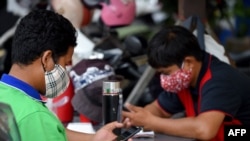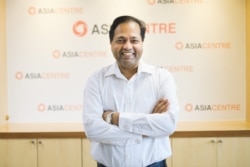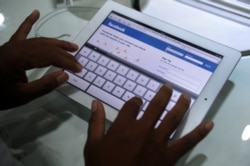Editor’s note: Cambodia’s descent into de facto one-party rule since 2017 has been marked by a shrinking civic space. According to a recent report by the Asia Centre, this has included a sharp reduction in online freedom of expression and increased surveillance of the country’s rapidly growing number of internet users. Dr. Robin Ramcharan, executive director of the Thailand-based research and advocacy think-tank, sat down recently with VOA Khmer’s Say Mony for an online interview about the implications of these measures, which include a plan to build a National Internet Gateway (NIG).
VOA Khmer: The Asia Centre just released a report titled, “Internet Freedoms in Cambodia: A Gateway to Control.” Why did the Centre name the report that way?
Ramcharan: Why did we title the report “A Gateway to Control?” Well, of course, I think your audience will know very well that a few months back, in February of 2021, the government issued the sub-decree announcing a National Internet Gateway, NIG. And this National Internet Gateway proposes that all internet service providers, all internet traffic, will be channeled—must be channeled—through one main national gateway. So, of course in the context of an already controlled, nearly controlled, information environment, including the internet environment now, the fear has arisen that the capacity for internet control has increased dramatically. And it might be possible for the government, when it wishes, to simply turn off the switch.
VOA Khmer: When it comes to fear, the report says, I quote: “Faced with threats and social media manipulation, critics and human rights defenders have retreated into self-censorship and withdrawal from political engagement to ensure their survival.” Can you elaborate more on this?
Ramcharan: Sure. In the context of Cambodia that you know very well, in the last decade or so, especially since 2010, the internet has really advanced and grown. Access to the internet infrastructure has grown very much in Cambodia. And we must be fair and say that that is to Cambodian authority and Cambodian people’s credit. The authority has done a good job in providing this access. At the same time, we know that the ability to express oneself freely has also been constrained in Cambodia over the decade. So, with what the [UN] Special rapporteur on the Situation of Human Rights in Cambodia has called “the monopolization of power”, the space for free expression has decreased in Cambodia.
With the advanced access to the internet that has taken place, more people have taken to the online sphere to express themselves, to express political opinions and so on. In recent times, online critics, bloggers and so on have been pursued by the government through various legal avenues. This has incited, I would say, a lot of reticence. And we use the term “fear” because people are reluctant to speak openly and to express themselves now openly on the internet platforms, on the social media. We also noticed, and we heard from stakeholders on the ground whom we have consulted in the course of writing this report, that the internet space for free expression, even online, has become highly problematic. The people, as a result, are now just holding back, self-censoring, what they say and how they say it in the online space.
VOA Khmer: If this continues, what is the long-term impact for Cambodians and Cambodia, and also considering the country is going to chair ASEAN [Association of Southeast Asian Nations] next year?
Ramcharan: We, along with others, have called on Cambodia to set a tone, to show leadership in this space. Cambodia has a lot of laws that limit free expression. Many of them ought not to have and should not have, and they are so contrary to international standards of human rights and also regional standards. Political leaders, especially, ought to know that if they enter a public arena they will face all kinds of criticisms of any kind. Really, that is acceptable, it should not be that problematic.
In that context of international and regional norms, which Cambodia has already subscribed to in its constitution, for instance, and by adhering to the ASEAN Regional Human Rights Declaration, it ought to show the leadership that is necessary for the entire ASEAN region, the Southeast Asia region. And to show to the world that we can progress in this area. Cambodia can really seize the opportunity to showcase such progressive and positive development.
VOA Khmer: But Cambodia’s [National Internet Gateway] sub-decree states that it aims to help preserve its “good tradition, social order and national security.” How would you respond to this?
Ramcharan: I know these are some of the positions put forward by the Cambodian authority in developing this NIG. Another [mentioned] reason has been to help with e-commerce and to increase revenues and all of these kinds of reasons. I would say that protection of harmony, protection of culture and so on does not require this kind of this excessive limitation on your fundamental freedom to free expression. Security reasons. How will the security of the state be affected if its own citizens say we need to improve? You know, the government is there to serve their people, to listen to their people. If you suspect your own people, that’s generally not a healthy situation.
So, I would say to the government there have been international best practices and around the world they have also moved in the direction of adopting these best practices for the benefits of their own people, for their own human security. That’s what the government is supposed to ensure. So, elsewhere best practices around the world have shown that if you protect those very fundamental freedoms, you have less to worry about. In fact, it improves the nation overall. So, generally, under international laws, limiting freedom of expression in the name of protecting culture per se is not really a genuine allowable excuse to protect your feelings or reputation. Those are not grounds on which you can limit such a fundamental right.
VOA Khmer: The Asia Centre recommended Cambodia repeal some laws and amend some controversial provisions. Cambodia currently has a single-party parliament, which would make it easier for the country to do that, but can you tell me why Cambodia needs to amend or appeal those laws?
Ramcharan: As part of… Asia Centre advocacy we have to make these calls because they are the logical steps. They are the natural logical steps that ought to be taken. So, the report is both practical and normative. So, if we can reach, for example, the Cambodian MPs, even from the ruling party to consider this then these are positive, progressive steps that can be taken and that we offer for consideration. Now, it will not happen tomorrow, of course. I think, in offering these steps, we are also telling the regional and international communities that these are the challenges that they should also be working towards when dialoguing with Cambodia.
VOA Khmer: Thank you so much for your time in the interview, Dr. Ramcharan.
Ramcharan: Sure, thank you very much to you and to VOA.












